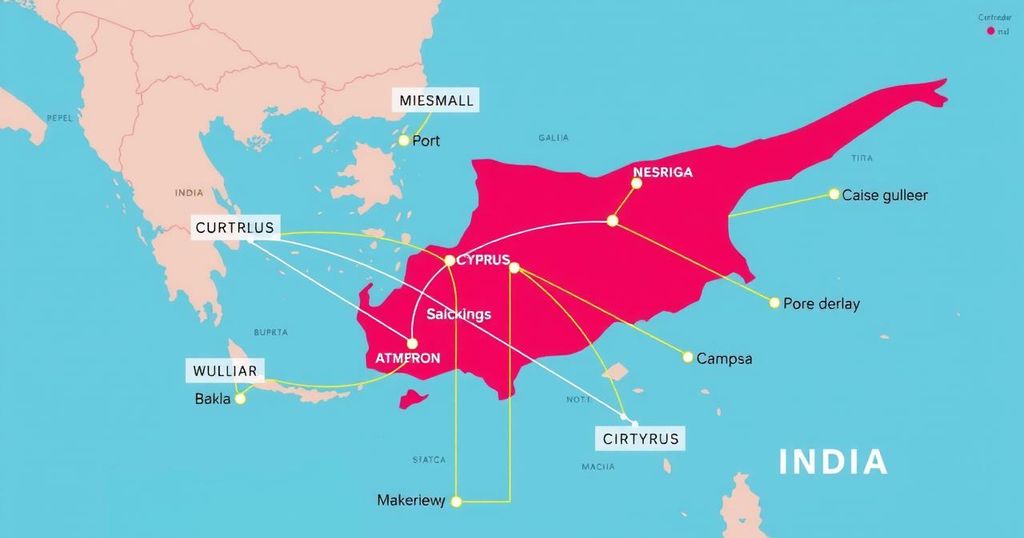Prime Minister Modi’s Visit to Cyprus Signals Strengthened Ties Amid Rising Tensions
Prime Minister Narendra Modi is set to visit Cyprus on June 15, 2025, as part of a diplomatic effort to strengthen ties amid rising tensions with Turkiye and Pakistan. With a focus on defense cooperation, the India-Middle East-Europe Economic Corridor, and enhancing relations with the EU, the visit is strategically significant. It aims at countering Turkey’s alignment with Pakistan while reinforcing a shared commitment to combating terrorism, especially in the aftermath of India’s Operation Sindoor.
On June 15, 2025, Indian Prime Minister Narendra Modi will visit Cyprus, marking a significant diplomatic occasion. This visit, part of Modi’s itinerary en route to the G7 Summit in Canada, is notable as it will be only the third time that an Indian prime minister has set foot in the Mediterranean island. It’s a timely diplomatic maneuver amid escalating tensions with the Turkiye-Pakistan axis, especially in light of India’s Operation Sindoor.
The trip signifies India’s intent to bolster ties with Cyprus, an EU member that has continuously backed India in crucial issues, including terrorism and UN Security Council reform. Modi’s discussions are expected to focus on increased collaboration in defense and the India–Middle East–Europe Economic Corridor (IMEC), a network aimed at connectivity and trade that positions India against China’s Belt and Road Initiative.
Historically, India’s relations with Turkiye have been rocky due to Ankara’s unwavering support for Pakistan, particularly regarding the Kashmir conflict. Following Operation Sindoor, India’s counter-terrorism offensive in Pakistan, Turkiye’s alliance with Islamabad has prompted India to engage more proactively with countries like Cyprus, which is at odds with Turkiye over long-standing territorial disputes. This trip sends a calculated message that India is leveraging relations with Turkiye’s adversaries to its favor.
Cyprus has been vocally critical of terrorism linked to Pakistan and has advocated for India’s security concerns at the EU level. By fostering a partnership with Cyprus, India solidifies its position against cross-border terrorism, aligning narratives that could amplify its global stance, particularly following the success of Operation Sindoor, which aimed to dismantle terrorist strongholds.
At a crucial political moment, Modi’s visit occurs ahead of Cyprus taking on the rotating presidency of the EU Council in early 2026. Cyprus has shown staunch support for India’s ambitions, including the quest for a permanent seat on the UNSC and entry into the Nuclear Suppliers Group. India’s backing of Cyprus’s territorial resolution efforts against Turkiye underlines a strategic partnership beneficial to both nations.
Modi and Cypriot President Nikos Christodoulides are also likely to discuss enhancing defense collaborations, which could include joint military exercises or sharing technology. Given the shared goals in maritime security and counter-terrorism, this visit presents a solid foundation for future cooperation.
The IMEC initiative, introduced during the G20 Summit in New Delhi in 2023, seeks to link India with Europe via the Middle East through a robust network of infrastructure. Cyprus, given its geographical advantage in the Eastern Mediterranean, stands to benefit as a pivotal player in this corridor and as a potential counterbalance to broader regional trade dynamics.
This visit, paired with a subsequent stop in Croatia, reflects a strategic approach to foreign relations characterized by the Modi Doctrine—an effort to cultivate both regional and international partnerships against adversarial coalitions. Engaging with Cyprus not only counters Turkiye’s backing of Pakistan but also solidifies India’s ties with nations like Greece and Armenia, similarly positioned against Turkiye.
The Cyprus-Turkiye dispute, known as the Cyprus Problem, is a bitter chapter in the region’s history. Cyprus, an island reflective of its mixed Greek and Turkish heritage, has endured tumult since gaining independence from Britain in 1960. An attempted coup supported by Greece led to Turkey’s invasion in 1974, resulting in a split that has persisted, with Turkish Cypriots in the north and Greek Cypriots in the south, an area monitored by the UN.
The ongoing division remains contentious, with Turkey championing a two-state resolution while Cyprus seeks reunification under UN guidelines. This disagreement complicates not only regional stability but also Turkey’s aspirations for EU membership, which have been hindered partially by its stance on Cyprus.
India’s strategy aligns with Cyprus at a crucial time while countering mutual opponents—in this case, Turkiye and its backing from Pakistan. Given Pakistan’s unwavering support for Turkey, including its silence on UNSC resolutions addressing the TRNC—a self-declared state recognized solely by Turkey—the connection between India and Cyprus strengthens. Modi’s visit thus reinforces a united front against terrorism while highlighting strategic engagement on a wider political scale.
Prime Minister Narendra Modi’s upcoming visit to Cyprus underscores India’s strategic shift to strengthen ties with nations that share its concerns regarding terrorism and regional stability. By aligning with Cyprus, India is not only addressing its geopolitical challenges with Turkiye and Pakistan but is also boosting its position within the EU framework. This visit enhances bilateral cooperation on various fronts and signals India’s commitment to countering adversarial influences.
Original Source: resonantnews.com




Post Comment